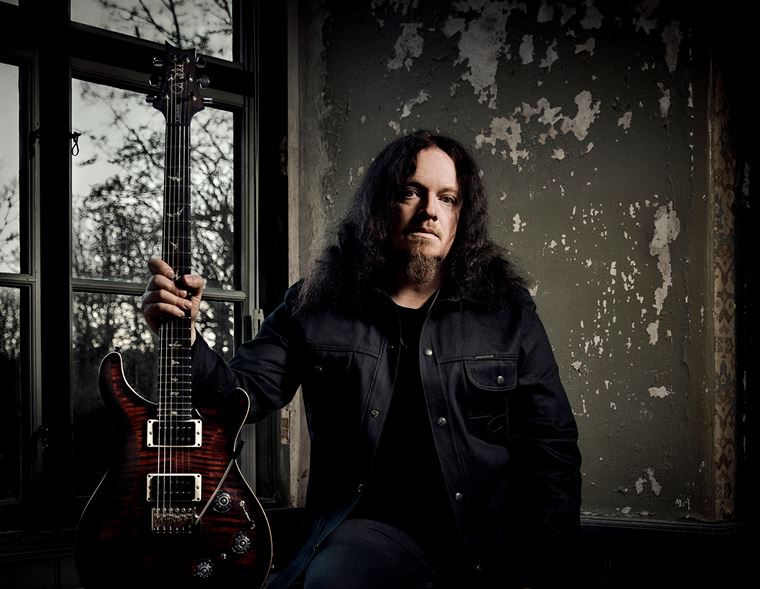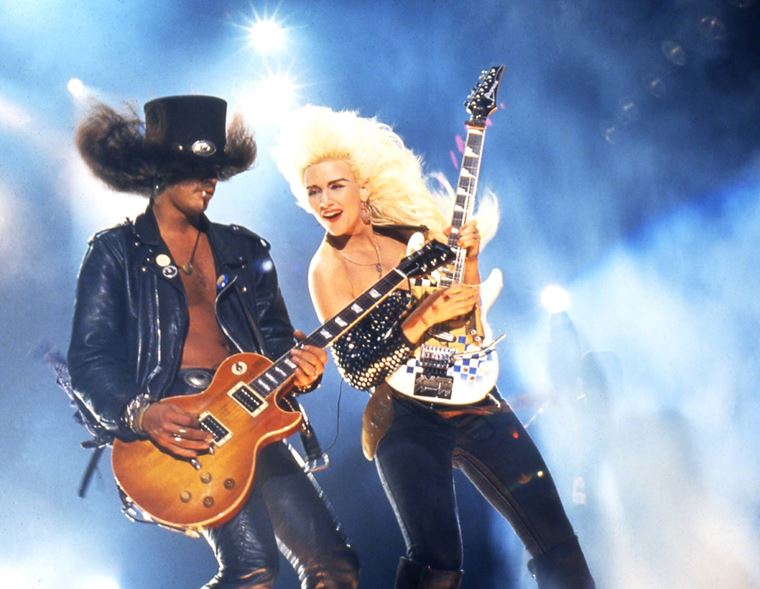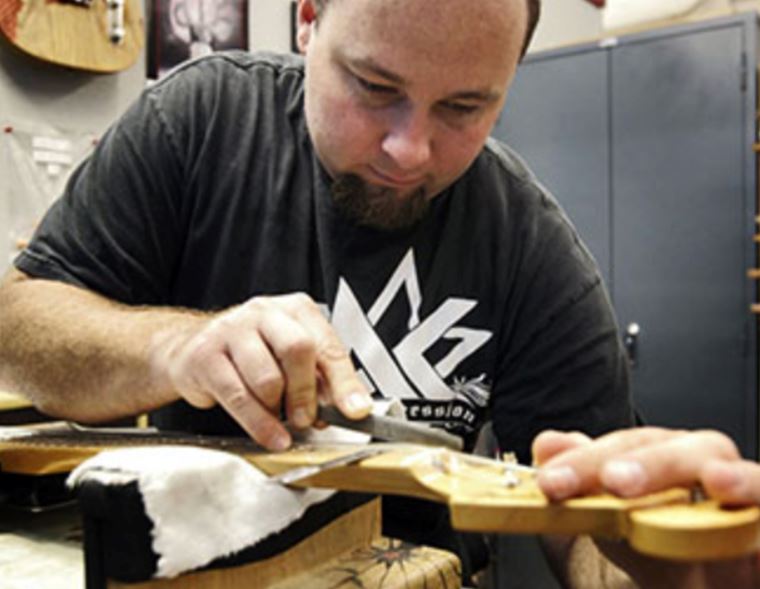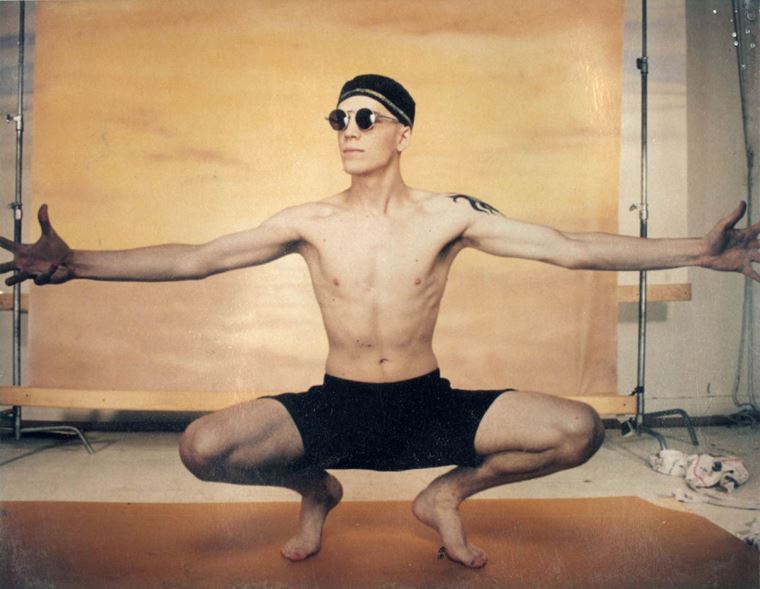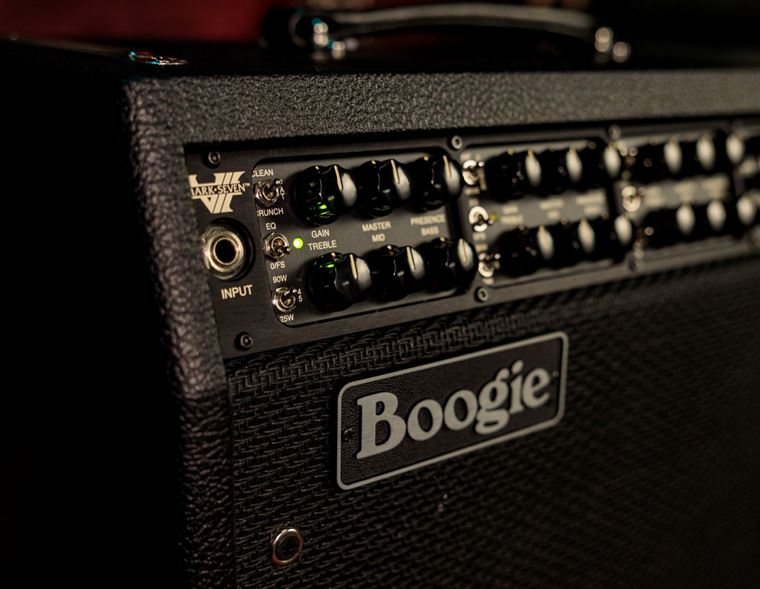Paul Reed Smith - Interview
Published on 24 November 2022
It's not a regular occurence to be given the opportunity to sit down with one of the most prestigious guitar builders in the world. First appearing in the mid '80s and very quickly making a name for both himself and his brand - Paul Reed Smith has seen all there is to see when it comes to guitars. In recent years we've seen PRS develop their budget friendly S2 & SE ranges, shock the world with the release of John Mayer's controversial signature Silver Sky guitar, as well as continuously changing the game in terms of ever improving appointments and electronics. With all that in mind, we found out all there was to know about PRS in 2022 with Paul prior to his intimate clinic at our guitarguitar Camden store.
guitarguitar: What should we expect to see on a shop wall of PRS Guitars?
Paul Reed Smith: A variety of stuff, you know? In order to survive… This is a world of ‘What do you got next, bud? What do you got new? What do you got?’ You know? It’s a ‘I like the last one, but already have one of those. I want something new, I want something new’ kind of world. It's almost like the cell phone that is changing constantly when you're looking at it.
I recommend that people buy guitars the way women buy shoes or men buy shoes. Bring me 12 pairs, get away from me. I'll tell you which pair I like. It's the same thing with guitars. Your experience is very powerful. It'll tell you how well the guitar is staying in tune, playing in tune, sustaining, sounding through an amp, how it feels in your hand, how the neck curve is, how it's set up.
I've been at clinics where people who had never played guitar had a better idea of the guitars I was playing and how good they were than the people that did play because the people that did play were using their memories to remember how good it was. But the people that didn't play were using their experience right in front of me about how good it was and that I trust. I think that that's beautiful. So when people are coming in to guitarguitar or they're coming in any shop, they should try them all. Bring me ten guitars of this type and say, you want a single coil guitar - bring me ten of them. Let me try them all. Get away from me or please stay and talk to me about the attributes of the guitar. People go to guitar shops because the people in the stores typically know more than the customers do. Although I've seen customers that knew more than all the sales people as well.
Because we’ve had so many models you're going to see a variety... that's just normal. I haven't run across one of these modern eagle tremolo guitars since I've been in England, and I like this guitar a lot (Paul is holding a Pre-Owned Modern Eagle). It's a cool guitar, you know? it's got a big ding in it, which I don't care about!
GG: Do you think the attention to detail that goes into a PRS Guitar is what makes you so popular?
PRS: Has a lot to do with it I guess. England takes a tremendous amount as a guitar country, it takes a tremendous amount of pride in nice things. Always has. From the crown jewels on down! I think that there's a real love of high quality stuff in this country. Japan's the same way. They love nice stuff. It's really admired. I was in the Netherlands a few days ago and they were just adoring good stuff. Europe's been doing it longer than Americans.
The Americans adore good stuff. It's not like they're not of a quality mind. They are. But you are in a guitar country and the guitar is the violin of our time.
It used to be when Paganini came to London, the docks would be full of people to greet this rock star, right? Yeah. Well, this is the new violin.
GG: Are you able to predict how a PRS ages?
PRS: Yeah, kind of. Because of an old piece of furniture made out of this wood - I have an idea. A guitar neck, a really good one, feels like an old railing in a house going down the stairs. It's comfortable. It's not sharp. It doesn't hurt. It's very comfortable in your hand. And this thing in my hand was carved dead right. It doesn't feel like a different neck here than here. Feels like the same neck.
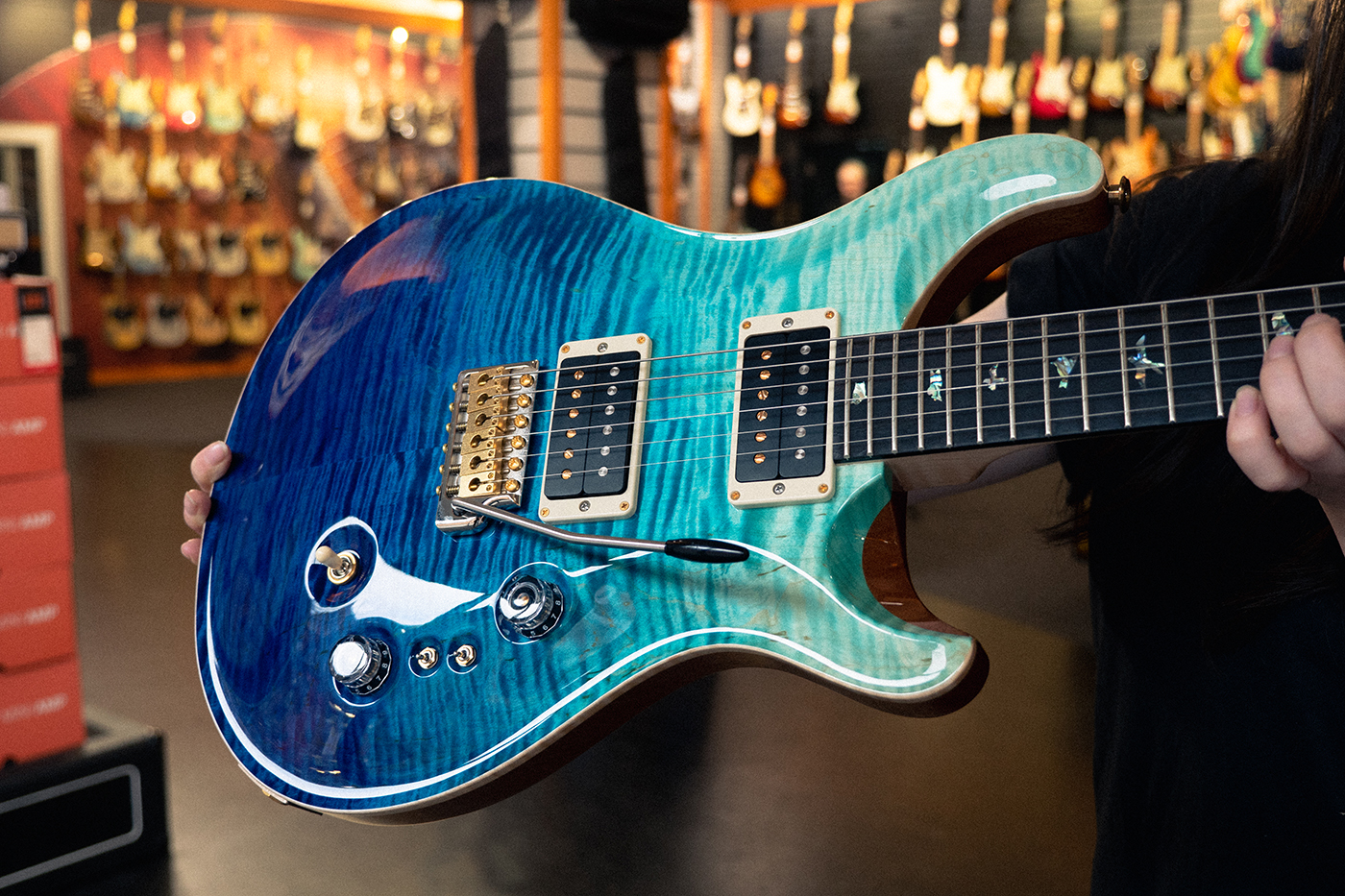
GG: How do you feel that PRS has established itself alongside the most iconic guitar brands? To us it almost feels like the ‘third’ electric brand in the shop.
PRS: I want people to get their money's worth. I want somebody who - let’s take the exaggerated position, decided they were going to study music and not go to college to be a, you know, English major or something. Right? I want them to get their money's worth so they get a PRS and they spent the money their grandmother gave them. I want them to be happy. If they worked really hard (for it) to be pleased with their purchase. It's real nice feeling that it was worth every dime you paid for it. To me, that's important.
I'm fighting 2 legacies, you know? The whole Fender thing in 1956 when I was born, they were right in the middle of their heyday. Gibson, a couple of years later was in the middle of their heyday. And I'm in diapers! So all that history wasn't with us, but we're getting a history.
For you to say we're one of the top three brands in the store, that warms my heart. I'll tell you a story. I was at the NAMM show, which is the American music messa. We had heard Fender, Gibson, Martin. Fender, Gibson, Taylor. Fender, Gibson, Ibanez. Fender, Gibson, whatever. One day we're walking down the aisle… Somebody says, Fender, Gibson, PRS.
I was like ‘Oh! We made the list!’
It was a big day. I literally celebrated the whole show. It's like we made the list and you could hear everybody talking in the booth. ‘I’ve got three brands in my store - Fender, Gibson, PRS and these are the investments I want to make and these are the models I want to order.’
it was almost a life saving day. At that trade show I got to sit down with Bob Moog, the synthesizer designer. We sat with our backs against the wall and talked about making an additive synthesizer, not a subtractive one. And he told me that he always wanted to do that. But a better way to go about it was subtractive and we were eating a hotdog of all weird things. I have good memories of that show because it was a turning point for our company. When you mention top three brands, It just makes me beam because that's not where it was headed.
I had a guy walk into our booth, he was a president of a guitar company. He goes ‘they're still here!? How’d they still get here, how did that happen?' I was standing right next to him and I said, hi, Mark! He goes ‘oof’ like I caught the dog still stealing the food, you know? And he didn't think I heard him.
I thought it was a good day. Yeah, we're still here. We fought hard to stay here. This has been a hard fought battle. England doesn't give up a position on the wall as a third brand that easy! That's not the way it's going to go. You gave us permission after looking at it a thousand times, not just once. It wasn't just accepted. The market gives you permission to be in the market. Once you've heard the first three Pink Floyd records, you're interested in the next one. The market has given it permission. You want more Pink Floyd? You know, or whatever brand it is.
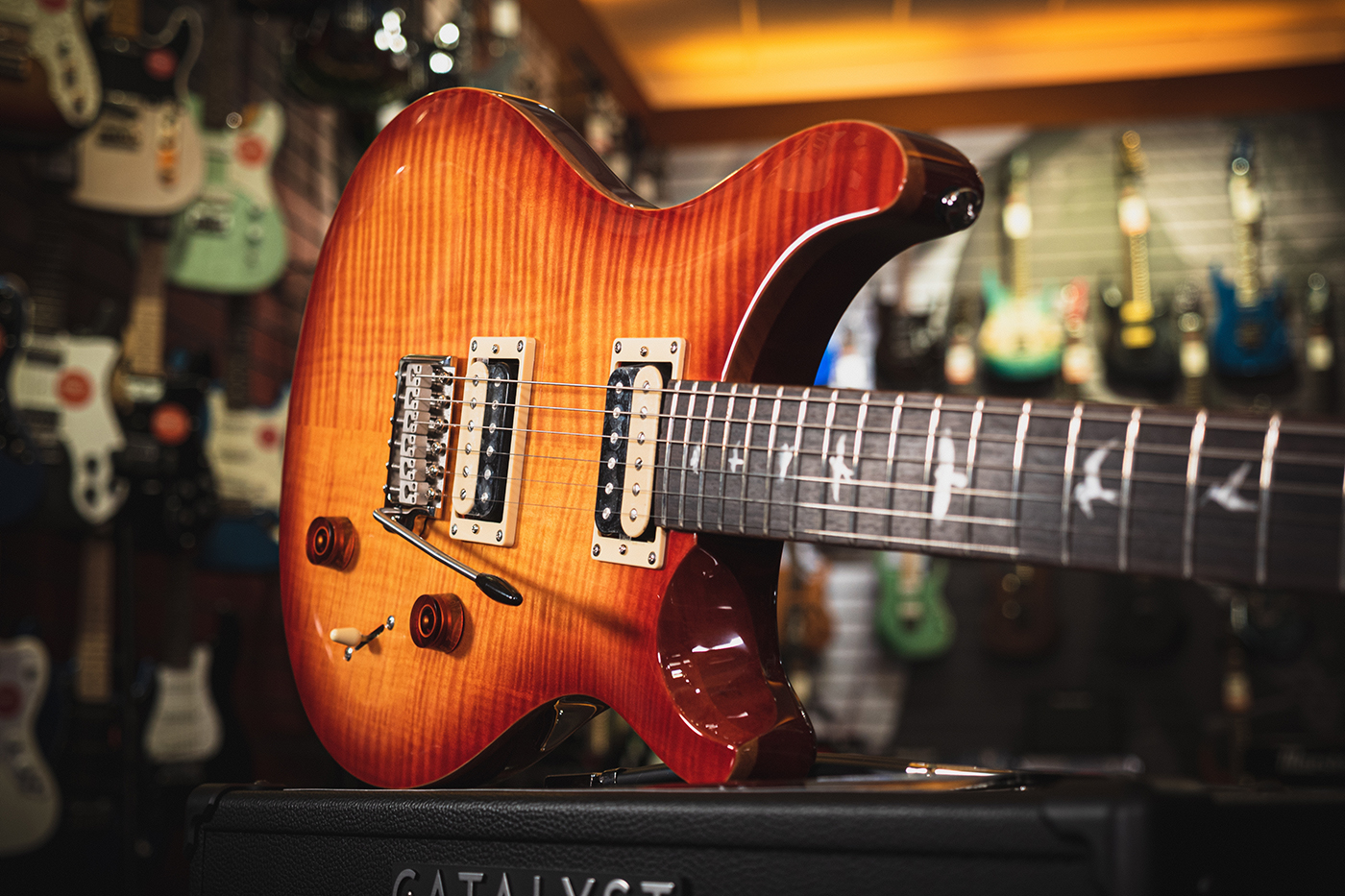
GG: Was it easy to develop your budget friendly SE & S2 ranges?
PRS: No, it was hard work. S2 - we've built a factory in the hopes that we could make a guitar in America in that factory for 2/5 the price of a core guitar. So, no it was hard work. It just had a natural evolving to it. But to me it was hard work. Getting the S2s to be able to be made at that price point, getting the SEs... We're on the phone every day at three in the morning, calling our manufacturer and teaching them. Not trying to get the price down. Teaching, teaching, teaching, teaching, guitar making.
‘How do you level the frets? How do you glue the frets in? How do you glue the nut on?’ Something that blows me away which I don't really understand.. Why would somebody spend a huge amount of time making a guitar and then put a nut on it out of the same material that you hook your toilet to your septic tank with PVC plastic? It doesn't make any sense. Why would you do that and then not glue it on just to save a minute, which changes the tone of the guitar its entire career. Its entire life. Unless somebody in a repair shop puts a bone nut on it or something that sounds better and glues it on.
Somebody gave me a beautiful instrument. It sounded awful. I found that it had a PVC plastic nut on it, took it off, put a bone nut on it and glued it on and the instrument instantly sounded better. Why save the time? It doesn't make any sense. Yeah, it's just a teeny bit more time. The instrument leapfrogs ahead in how good it sounds. I don't know, it just doesn't make any sense to me.
When we released The SE Silver Sky we got 13,000 orders in one day. It was accepted exactly how we wanted, which is that it could be a real satisfying purchase for somebody in that price range. Very satisfying. We've worked so hard on that whole SE range. I'm glad to hear you say it. Do you sell a lot of them in the shop?
GG: Yeah, definitely. Yeah. As you say with the SE Silver Sky. I think we've only just got to the point now where they come into a shop and stay on the hanger for longer than a day!
PRS: What!? One day. Yay! One day it comes in. It goes out one day, and that's good.
GG: Did you have any worries making John Mayer’s Signature PRS Silver Sky?
PRS: No. No, you're not going to tell John no! After we had done The Super Eagle, which is the instrument he needed for The Grateful Dead, it was logical for him. That's not the kind of instrument he played in his own band. It’s like he was an organ player in one band and a piano player in another band. He needed a different kind of instrument.
We knew it was going to cause a lot of trouble. We knew that. Somebody called me after we released it and told me I'd farted in a spacesuit. In other words, the fart smells never going away! You've ruined it.
About a year later, the rock star got one of the guitars and adored it. I said ‘you said I farted in a spacesuit!?’ He goes, ‘Yeah, I like the decisions. I like the neck shape, I like the pickup sound. I like the bridge. I like the way it feels, like the way it balances. I like all the decisions that John made.’ He said he made good decisions, which I thought was very complimentary. So it went from ‘you farted in a spacesuit’ to ‘I play it all the time’ which I thought was wonderful.
John told me a story that I really liked. When he was going to play in Dead & Company, the internet went nuts. Like, This is a big mistake, a bad idea. He said ‘Well, we expected that, but we'd been to rehearsals. We knew how good it sounded. We knew what the band sounded like. So we weren't scared at all because we've been to rehearsals.' When he started playing concerts with them, the acceptance was overwhelming by a very tough crowd. Same thing with the Silver Sky. We'd held them, we played them, we'd gone through all the prototypes. We knew it was coming. I knew what that neck shape was. I knew how that pickup sounded. I knew how well the bridge worked. So I wasn't scared.
When we released it, we got our website blown up. He was getting a thousand likes a minute, 60,000 likes an hour, which is millions of people viewing an hour. The website literally shut down. He knew what he was doing, completely knew what he was doing. We got schooled!
Look, it's okay. It's a new adventure for the company. It's a new adventure for the industry. We got lambasted for doing a seven and a quarter inch radius. ‘You can't you can't play solos on a seven and a quarter inch radius! You can't do that!’. I started laughing. I said I thought ‘Sultans Of Swing’ sounded pretty good. I thought ‘Machine Gun' sounded okay! I thought all the Eric Clapton solos on Strat, you know, ‘Ocean Boulevard’ sounded really good. They were all seven and a quarter, but you can't play a solo on a seven and a quarter?
Here's the truth. If you don't have the neck dead straight and you don't have the frets dead level and it's not set up right, it is a problem. But if you get all that right, it's not a problem. And the reason they did (8.5”) on the SE silver sky was just to relax the strictness of 7.25” so much. It worked. Nobody's going to complain at all. But we got read the riot act! ‘You can't do that!’ Because other companies decided it was a mistake. We didn't think it was a mistake.
I still think ‘Sultans Of Swing’ sounded good. You ever listened to ‘Brothers In Arms’? Sounds good to me. I don't know what radius ‘Brothers In Arms’ was played on but I'm almost positive ‘Sultans Of Swing’ was played on a 7.25” radius. But you know… you can't play a solo on 7.25”. Oh, by the way, Gravity was played on 7.25”, right? John Mayer's playing on that tune was spectacular. (Paul sings) Gravity. Great tune.
GG: Do you give every artist the same time and attention when making an Artist Signature Guitar?
PRS: Two years of nonstop discussions and prototypes, three years nonstop. You don't think Carlos Santana knows what he wants? You don’t think Mark Tremonti knows what he wants!? These are kings in their world. They care about what they think and their obligation to their fans and to the buying public is that if they're happy, then there's a really good chance the buyers will be happy. They think of themselves as the acid test.
David Grissom will not bring a PRS DGT model to a clinic. He takes one off the wall to hold my hands to the fire. Smart. Really smart. He’s willing to risk a bad experience if it doesn't go well to make sure that our hands are held to the fire. He doesn't want it to be only the one he plays and then the rest of them are rubbish, as you would say. He wants them all magic. David's cool, he's smart. None of these people… None of them are stupid. They're all brilliant. You don't go watch somebody play for 20,000 people that is capable of what the person sitting next to you is capable of. Mostly they're doing something that is so specialised and so powerful that you are willing to travel and spend money to be there, give your time, your money, your energy, your care, all of it.
It's cool. Watching Joe Walsh play at Wembley for the Taylor Hawkins Tribute with his PRS - that was just awesome. I was yelling and I just thought it was great.
GG: Does seeing artists perform on television and huge stages bring you satisfaction?
PRS: No, it's not satisfaction I experience. I experience - I hope he's okay. I experience - I hope the guitar is doing its job. They’re not fighting it in any way. There's no broken string. I want the thing to do its job. It's not about being satisfied. It's about taking care of my partner. When I saw Carlos Santana play a guitar at the Grammys, I just wanted to make sure it was okay. I wanted to make sure it got through the tune. It did its job. Believe me, all the techs wanted that, too!
I saw Rupert Neve give a talk once on Neve consoles and he was talking about making consoles for the BBC. He said ‘You guys are all nuts about how it sounds, and I didn’t care about how it sounded. I cared that a channel never went down because if a channel went down on a news program - somebody lost their job. I was worried about them not losing their job. It couldn't fail.’ That was the whole deal. If somebody is on camera with the prime minister and they're doing an interview, you don't want that channel to go down - somebody's going to lose their job. I thought that was very instructive. So when you're asking a question of how I feel when I'm watching them, I don't want the channel to go down. I want the guitar to do its job.
We took Hendrix's amp apart. They had done so many things in that amp to make sure that it didn't blow power tubes. They had lower voltages. They had done all kinds of things to make sure that it survived during a concert. He didn't want the amp to blow up while was playing through it and he was abusing it! He was taking it to its limit in a good way. The way in which we would expect him to do it live. We opened the amp and man, they had done so many things to make sure it was customer service ready. That was cool.
The Rupert Neve interview, he said ‘I didn't care how it sounded, I wanted to make sure it worked.’ I mean, the consoles were built like tanks. They didn't want them to fail. They want everything to always work. There's so much electronics, so many things to go wrong. They were built like tanks.
GG: So… quality is at the forefront of every design choice you make?
PRS: You put that T-shirt on this morning, you put it on. You never even thought about it afterwards. So it did its job. But if it's got a burr in it it’ll bother you all day. You’ve got to get all the burrs out of T-shirts. It doesn't work. It's a tool to do a job.
Now, if a guitar sounds better than any other one in the rack or and plays better and inspires you more, then that's even more gravy. That's even better. I'm working really hard to get things to sound as best as I can. We're learning so much about pickups right now and we're putting it in as fast as we can into the guitars. I brought a prototype here that I can't show on film, but I think it sounded wicked good.
GG: What guitar are you most proud of making?
PRS: I don't know. Maybe the first guitar that Carlos made famous to the world. Maybe the one that he showed everybody, I don't know. Maybe the guitar that was played at Taylor Hawkins Tribute Show at Wembley. This guitar I'm holding, I don't know. I don't have a specific (proudest) spot.
GG: So… what makes a good guitar?
PRS: A really good guitar is bright on the low strings and real thick on the high strings. A really bad guitar is bass-y on the bass strings and really high endy ice picky on the high strings.
Look, you can find out how good a guitar is with a stopwatch. A guitar that rings for 12 seconds is not as good as a guitar that rings for 45 seconds, period. End of story. The guitar maker who built the one that rings 45 seconds flat out knew better what was going on than the one that rang for 12 seconds. It's like having a rubber nut in a rubber bridge on. It's going to deaden the string. You want a guitar that doesn't shut down the string.



